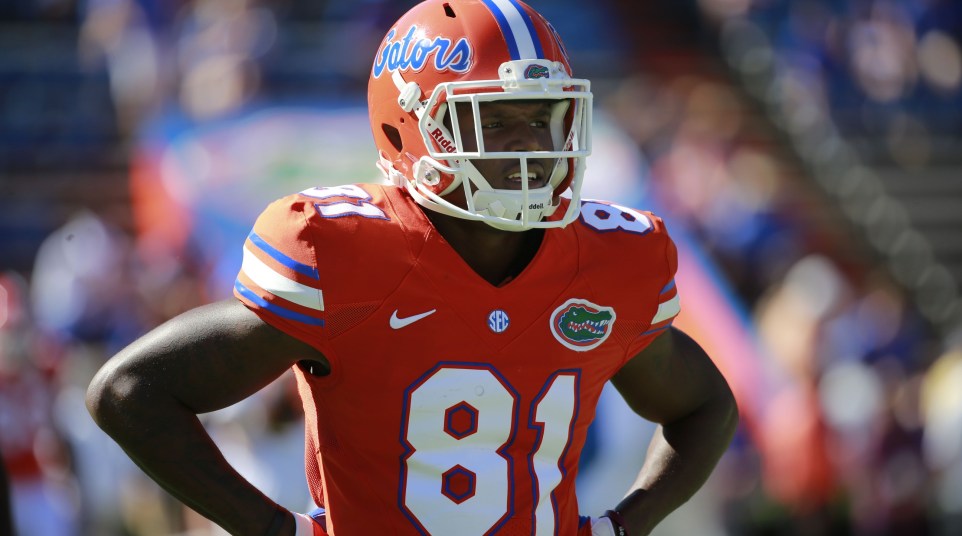
Will Antonio Callaway ever get it?
GAINESVILLE — Say it ain’t so, Antonio.
That’s what we would say about the recent news that former Florida Gators star Antonio Callaway failed a drug test at the NFL Combine if it weren’t so incredibly, astoundingly predictable.
Yes, it was a “diluted sample,” rather than a full positive, which Callaway’s new agent, Malki Kawa, is attempting to use to soften the effect of this revelation, which comes on the eve of a draft where Callaway was expected to be selected on Day 2 or 3, despite having first-round talent.
And no, the fact Callaway yet again tested positive for marijuana doesn’t mean Callaway is a bad person, or a criminal, or any of the other cruel, bridge-too-far takes that exploded on social media yesterday in the aftermath of the news.
But somewhere in between, there’s the painful reality of the latest failed test for Callaway.
Antonio Callaway entered this draft process on thin ice to begin with.
From the Title IX investigation in 2016 related to a sexual assault charge (Callaway was cleared after hearing) to the May 2017 misdemeanor possession of marijuana charge to last summer’s participation in the Credit Card Nine, where Callaway defrauded his own university of thousands of dollars, was suspended for the entire season and ultimately received diversion for utilizing a stolen credit card, Callaway has rarely stayed off the police blotter and on the football field. Callaway’s reported associations with known Gainesville drug dealers casts even more doubt on his character.
Callaway’s talents as a receiver are inarguable.
“On talent, Callaway is a first-round draft choice,” longtime ESPN Draft analyst Mel Kiper Jr. said this week. With great speed in the second level, advanced route running ability and an innate ability to get separation against press coverage, Callaway has drawn comparisons to Antonio Brown from a pure football perspective.
But as in life, there’s more to success in the NFL than football ability.
The NFL is a business, and Antonio Callaway is far too big a risk for any rational business person to take.
Think of Callaway’s most recent failed test this way: Already up against it, already out millions of dollars for off-field mistakes, fighting for another chance, one he’s only receiving because of incredible, innate talent, Antonio Callaway arrived at the NFL Combine and promptly failed a drug test.
He couldn’t even stay clean for the most important job interview of his life. Making matters worse, he failed the test the same day he sat down with countless NFL front office folks and sold a “new, changed Callaway.”
“Losing football for a year, that experience right there, taking football, me away from the game I love, it humbled me,” Callaway told the media at the NFL Combine. “It hurt me. Coach Mac lost his job, and that’s on me. I was young and dumb. I’m here to let them know I’ve grown up, I’m past that, I made a mistake and I’m ready to show them that. I’ve matured.”
Imagine saying that when you know, deep down, there’s a decent chance you’ll fail your drug test. Imagine the nerve.
Then imagine doubling down on the changed man narrative, and being unwilling to revisit the past at the same time, as Callaway did at Florida’s Pro-Day.
“It happened. It happened. I can’t cry over spilled milk,” Callaway said at Pro Day, while thanking Florida’s new coach, Dan Mullen, for allowing him to participate.
“But I’m a great person. I’m not this bad person that the media portrays. I mean, I can’t stress it enough. I just got to … let my actions speak for me,” he said. “Because of the things that happened in my past … they think I’m just this wild person. I ain’t no wild person. Besides, I’ve got a daughter to think about now. I ain’t got no choice but to make the right decisions.”
Powerful words, powerful story.
Callaway’s daughter, born before the NFL Combine, should have put things in perspective immediately, and might still prove life-changing for the 21-year-old young man.
Here’s the thing: This isn’t about being a good person. It’s about making good choices. Callaway’s latest drug test failure is more evidence that in a world more concerned with actions than words, he simply doesn’t get it.
It’s starting to look like he never will.
After the story broke, I texted one NFL assistant who wished to remain anonymous about Callaway’s NFL prospects.
“We didn’t even have him on our board before this,” he texted. “I only know of a handful of teams that did. I can’t imagine they will now. Why waste a draft pick?”
The question now is more about whether Callaway will become a wasted life, a ne’er to do has been who spends most his life wondering what could have been.
Only 21, there’s time, although less of it than Callaway seems to think, for the receiver to change, to take responsibility for himself and the choices he makes in life.
I hope he does.
It’s ineffably sad to see such a prodigious talent wasted and lost to creature comforts, bad choices or the streets.
For now, there’s overwhelming evidence suggesting Callaway will never get it.
And if it the trend doesn’t change, it will cost him more than the millions of dollars already lost in the NFL Draft.
